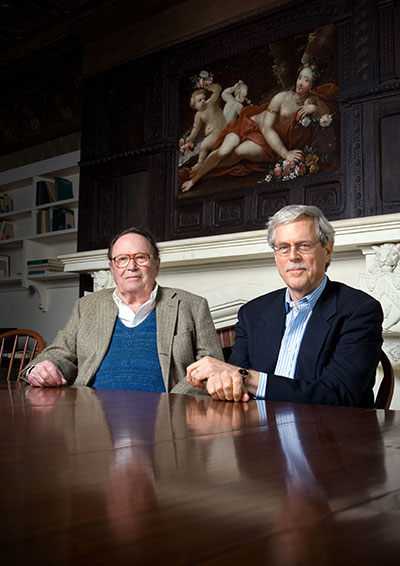
Wilbur (left) and Sofield in 2009 in Converse Hall, where they taught poetry together
I must have met Dick Wilbur at a dinner that Bill and Marietta Pritchard had for him after one of his periodic readings at the College, but I remember being too star-struck to say much to him. I’m afraid that my admiration for what Dick did with words, ideas and feelings was such that I could do no more than acknowledge that I was, well, a fan. By the 1970s Richard Wilbur was, by common consent, the dazzling virtuoso of post-World War II poetry in English. His third book, Things of This World (1955), won all the prizes, as it should have. And he was hard to imitate, although many tried: it is not given to more than two or three poets in a given generation to have the education (Amherst!—in his case, and then the war and then Harvard), and the ear, and the inventiveness to carry off poems as rich, as profoundly satisfying as, say, “A Baroque Wall-Fountain in the Villa Sciarra.” There are numerous others.
Then two things changed. In his next books of poems he began to dampen the fireworks a bit, with the result that one’s admiration gradually deepened into gratitude that someone out there was fully experiencing a recognizable, an available world—the created world, of course, but also that of people closest to him and those who happened his way, like the Roman “Mind-Reader” whom he evoked in a major long poem. For me the pivotal, or at the least the representative, poem here is “April 5, 1974,” a poem he could not have written had he not been an acute reader and a good friend of Robert Frost. It’s a small miracle of language, perception and music—and of analogy. In his great late poem “Lying,” Dick offers a defining line: “Odd that a thing is most itself when likened.”
The other change was the result of one of the happiest accidents to come my way: Dick’s beloved wife, Charlee, asked me, at another post-reading dinner, if I played tennis. I said I did. She asked if I would like to be Dick’s doubles partner in a game against two local attorneys. Sure, I said, and it came to pass.
Exactly what came to pass I could not have begun to foresee. We prevailed over the law, barely, and then we had post-match gin and tonics (mint from Dick’s garden in Cummington, Mass.), and then we swam in Dick and Charlee’s pool, and then we talked a bit about poetry.
And then, after years and years of more tennis and talk, Dick was invited to become the John Woodruff Simpson Lecturer at the College, the position created after World War II to bring Robert Frost back to Amherst a couple of times a year to give readings and to talk with the fraternity lads (Dick was a notably loyal Chi Psi). Dick told the College president that, yes, he would do it, if I would agree to teach with him. Of course I agreed, if not without some apprehension, knowing, for example, that Dick’s store of memorized poems was truly vast.
So for seven years, from 2008 to 2014, we did teach together. In time I more or less overcame my fear and trembling. Charlee Wilbur died in 2007—do read and reread Dick’s three late love poems, “For C.,” “The Reader” and “The House.” On her death Dick must have been—no, he was—at something of a loss; as many have noted, their marriage was a supremely fortunate one. So his returning to the classroom at age 87 turned out to be, I think, consoling. And it was useful, a word Dick used carefully. He once responded to the question—why did you start writing poems?—posed to him by his geology-major student driver, with this short sentence: “To be useful.” And he was that, to students at the five colleges where he taught—Harvard, Wellesley, Wesleyan, Smith, Amherst—and as he will be to those future readers fortunate enough to find his work. R.I.P.
